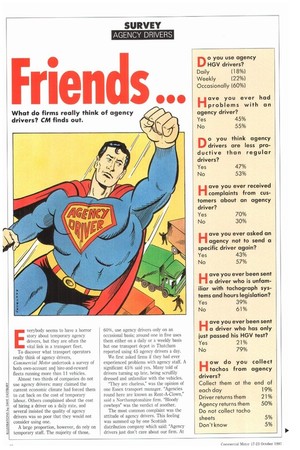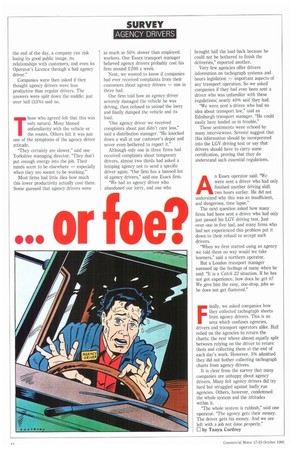E verybody seems to have a horror story about temporary agency
Page 44

Page 46

If you've noticed an error in this article please click here to report it so we can fix it.
drivers, but they are often the vital link in a transport fleet. To discover what transport operators really think of agency drivers, Commercial Motor undertook a survey of both own-account and hire-and-reward fleets running more than 11 vehicles.
Almost two thirds of companies do not use agency drivers: many claimed the current economic climate had forced them to cut back on the cost of temporary labour. Others complained about the cost of hiring a driver on a daily rate, and several insisted the quality of agency drivers was so poor that they would not consider using one.
A large proportion, however, do rely on temporary staff. The majority of those, 60%, use agency drivers only on an occasional basis; around one in five uses them either on a daily or a weekly basis but one transport depot in Thatcham reported using 45 agency drivers a day.
We first asked firms if they had ever experienced problems with agency staff. A significant 45% said yes. Many told of drivers turning up late, being scruffily dressed and unfamiliar with the vehicles.
"They are clueless," was the opinion of one Essex transport manager. "Agencies round here are known as Rent-A-Clown," said a Northamptonshire firm. "Bloody cowboys" was the verdict of another.
The most common complaint was the attitude of agency drivers. This feeling was summed up by one Scottish distribution company which said: "Agency drivers just don't care about our firm. At the end of the day, a company can risk losing its good public image, its relationships with customers, and even its Operator's Licence through a bad agency driver."
Companies were then asked if they thought agency drivers were less productive than regular drivers. The answers were split down the middle: just over half (53%) said no.
Those who agreed felt that this was only natural. Many blamed unfamiliarity with the vehicle or the routes. Others felt it was just one of the symptoms of the agency driver attitude.
"They certainly are slower," said one Yorkshire managing director. "They don't put enough energy into the job. Their minds seem to be elsewhere — especially when they are meant to be working."
Most firms had little idea how much this lower productivity actually cost them. Some guessed that agency drivers were as much as 50% slower than employed workers. One Essex transport manager believed agency drivers probably cost his firm around £200 a week.
Next, we wanted to know if companies had ever received complaints from their customers about agency drivers — one in three had.
One firm told how an agency driver severely damaged the vehicle he was driving, then refused to unload the lorry and finally dumped the vehicle and its load.
"One agency driver we received complaints about just didn't care less,' said a distribution manager. "He knocked down a wall at our customer's depot and never even bothered to report it."
Although only one in three firms had received complaints about temporary drivers, almost two thirds had asked a temping agency not to send a specific driver again. "Our firm has a banned list of agency drivers," said one Essex firm.
"We had an agency driver who abandoned our lorry, and one who brought half the load back because he could not be bothered to finish the deliveries," reported another.
Very few agencies offer drivers information on tachograph systems and hours legislation — important aspects of any transport operation. So we asked companies if they had ever been sent a driver who was unfamiliar with these regulations; nearly 40% said they had.
"We were sent a driver who had no idea about transport law," said an Edinburgh transport manager. "He could easily have landed us in trouble."
These sentiments were echoed by many interviewees. Several suggest that this information should be incorporated into the LGV driving test or say that drivers should have to carry some certification, proving that they do understand such essential regulations.
An Essex operator said: "We were sent a driver who had only finished another driving shift two hours earlier. He did not understand why this was an insufficient, and dangerous, time lapse."
The next question asked how many firms had been sent a driver who had only just passed his LGV driving test. Just over one in five had, and many firms who had not experienced this problem put it down to their refusal to accept such drivers.
"When we first started using an agency we told them no way would we take learners," said a northern operator.
But a London transport manager summed up the feelings of many when he said: "It is a Catch 22 situation. If he has not got experience, how does he get it? We give him the easy, one-drop, jobs so he does not get flustered."
Finally, we asked companies how they collected tachograph sheets from agency drivers. This is an area which confuses agencies, drivers and transport operators alike. Half relied on the agencies to return the charts; the rest where almost equally split between relying on the driver to return them and collecting them at the end of each day's work. However, 5% admitted they did not bother collecting tachograph charts from agency drivers.
It is clear from the survey that many companies are unhappy about agency drivers. Many felt agency drivers did try hard but struggled against badly run agencies. Others, however, condemned the whole system and the attitudes within it.
"The whole system is rubbish," said one operator. "The agency gets their money. The driver gets his money. And we are left with a job not done properly." 0 by Tanya Cordrey




















































































